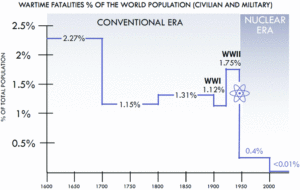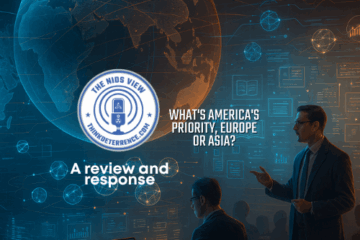With the recent release of Annie Jacobsen’s highly acclaimed novel, Nuclear War: A Scenario, Americans are waking up to the fact that it is time to reconsider the role of nuclear weapons in national security. One area that Jacobsen, among many authors, does not consider is the increase in global warming brought about by the existence of great-power nuclear arsenals.
In 2024, the world’s population surpassed 8 billion citizens. This is more than a 300 percent increase since 1950, which is an important year for global warming. It was this year when carbon-dioxide (CO2) emissions began to increase dramatically—driving up the global temperature.
Today, the average American emits about 15 tons of greenhouse gases annually, while the average African emits less than 1 ton per year. The global mean is about 4.3 tons per person per year, a 4.8 percent increase over the previous year.
As the Bulletin of the Atomic Scientists points out, the planet is now feeling the devastating effects of the 1.1-degree Fahrenheit increase in global temperature since 1880. According to the Bulletin, recent global warming is responsible for the increased risk of wildfires, the rise of rare diseases, the decline in global crop yields, and may even cause a “mosquito-pocalypse.”
Nuclear weapons deserve a large share of blame for these events. Let me explain.
Nuclear Weapons and Climate Change
As the graph below illustrates, 1–2 percent of the global population, mostly civilians, perished annually because of war between 1600 and 1945. Since 1950, with the development and fielding of great-power nuclear arsenals, that number has declined to less than 0.1 percent.

It is no mere coincidence that the global population has increased 300 percent in only seven decades. The fielding of large nuclear arsenals by the United States and Russia ensured that the great powers and their allies would not engage in World War III, or any other great-power war, that historically ensured the planet did not become overpopulated. Built on a foundation of White privilege, nuclear deterrence created a fear of utter destruction, which completely eliminated great-power war and led to a marked decline in the frequency and severity of all conflict—causing the human population to explode. Thus, the check on population growth was removed.
These weapons not only limit war, but they also decrease defense expenditures and the resources required for reconstruction after war. For example, the United States spent almost half of the nation’s gross domestic product (GDP) waging a world war from 1942–1945. More recently, the United States spent at least $3 trillion fighting limited wars in Afghanistan and Iraq. However, because of the Soviet and American nuclear arsenals, American defense spending, as a percentage of GDP, averaged a mere 5 percent during the Cold War and is now at a low of 3.5 percent.
The consequence of this reallocation of wealth from conventional warfare was unprecedented economic growth, which not only allowed populations to increase but also allowed societies to improve the health, prosperity, and consumption of their citizens—dramatically reducing poverty and increasing the average life expectancy (62 percent). This prosperity also led to the most rapid increase in technological development in human history.
The population growth and human prosperity brought about by seven decades of effective nuclear deterrence may appear to be a net positive, but a closer look reveals that human prosperity comes at the cost of devastating increases in the rate of global warming. There are simply more humans generating more greenhouse gases than ever, and the problem is only getting worse. There is a solution.
Solving the Climate Change Problem
It is time for the United States to take the lead in nuclear disarmament. If the United States, Great Britain, and France disarm, Russia, China, and North Korea will surely follow suit. The global community can then pressure India and Pakistan to disarm as well.
This does not mean we must put an end to war. Nuclear disarmament properly allows the world to return to waging large-scale conventional wars, which regulate population growth and economic prosperity. Such wars will help bring man-made global warming to an end. For example, a war between the United States, Russia, and China—post nuclear disarmament—would optimistically eliminate 80–160 million people. The planet would receive a respite in CO2 production not enjoyed since the COVID-19 pandemic lockdowns of 2020–2021.
The return to large-scale warfare will also ensure worldwide economic degrowth, which will further reduce overall greenhouse gas emissions. It is only through a less prosperous world that we can ensure global warming ends. Another equitable feature of this strategy is that population will be reduced among the richest, most consumptive nations, possibly leaving room for some modest increases in the developing world.
Some may balk at this solution because they believe a return to great-power wars is not necessary because green energy will solve the problem. Unfortunately, green energy’s high cost, unreliable energy production, and visible failures in Texas, Germany, and elsewhere are likely to turn people against a degrowth strategy relying on a green energy transition. Despite our best efforts, renewable energy simply cannot meet the insatiable demand of a wealthier and healthier global population. A return to widespread warfare is the only feasible solution.
It is time we follow the advice of Jonathan Swift, who, in his pamphlet, “A Modest Proposal: For preventing the children of poor people in Ireland, from being a burden on their parents or country, and for making them beneficial to the publick,” courageously sought to solve the Irish poverty problem by encouraging the Irish to sell their children as food for the hungry. Making the world safe for war is an equally innovative approach to ending global warming and deserves the same consideration Swift’s proposal received. We must act before it is too late.
Postscript
For those wondering if this is a serious article, the answer should be obvious, no. The article employs a rhetorical technique, reductio ad absurdum or, as Jonathan Swift called it, satire, to make a point. In short, a world without nuclear weapons is prone to frequent great-power wars that create greater human misery. No amount of hope can change what history and human nature have, for at least five thousand years, shown to be true.

Adam Lowther, PhD, is Vice President of the National Institute for Deterrence Studies. The views expressed in this article are the author’s own.
About the Author

Adam Lowther
Dr. Adam Lowther is Vice President of Research at the National Institute for Deterrence Studies. Read the full bio here.




